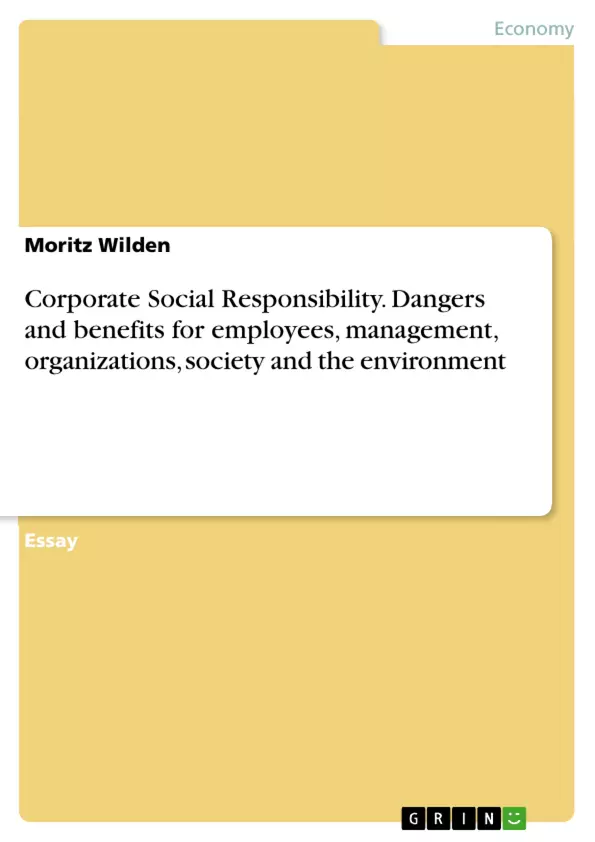The paper is about the pro's and con's of Corporate Social Responsibility (CSR). In detail, this essay is about the benefits and dangers of CSR for all stakeholders and the environment. Two global companies will be used as examples to explain the dangers and benefits of CSR. On one side, the of the world's largest beverage manufacturers, Coca Cola, and on the other side one of the world's largest consulting companies, Accenture.
Since 2007, the Etisphere® institute measures the ethical responsibility of the biggest companies worldwide. The term ´Corporate Social Responsibility´ stands for all those ethical actions and measures taken by companies. The global measurement of CSR by Etisphere proves, that many global and national companies care about their CSR. Furthermore, it demonstrates, that CSR is held in a great esteem by businesses. In face of this fact, the question arises, which effect CSR on society, employees, management, environment and the organization has.
Inhaltsverzeichnis (Table of Contents)
- What are the dangers and the benefits of corporate social responsibility, for employees, management, organisations, society and the environment?
- Introduction
- Dangers of Corporate Social Responsibility
- Society
- Organization
- Employees and Management
- Benefits of Corporate Social Responsibility
- Environment
- Society
- Employees
- Organization
- Management
- Conclusion
Zielsetzung und Themenschwerpunkte (Objectives and Key Themes)
This essay examines the advantages and disadvantages of Corporate Social Responsibility (CSR) for various stakeholders, including employees, management, organizations, society, and the environment. It uses the examples of Coca Cola and Accenture, two global companies, to illustrate the complexities of CSR.
- The potential manipulative use of CSR measures for deceiving customers and employees.
- The risk of tax avoidance by businesses.
- The cost factor associated with implementing ethical measures.
- The positive impact of CSR on sustainability and environmental protection.
- The contribution of CSR to societal well-being through donations, education, and minority advancement.
Zusammenfassung der Kapitel (Chapter Summaries)
- Introduction: The essay introduces the concept of Corporate Social Responsibility (CSR) and its significance in today's business world, citing the Etisphere® Institute's global measurement of ethical responsibility. The essay also outlines the focus of the paper, which is to explore the benefits and dangers of CSR for all stakeholders.
- Dangers of Corporate Social Responsibility: This section discusses the potential risks associated with CSR, specifically focusing on the dangers for society, organizations, and employees. The author argues that CSR can be used deceptively to manipulate customers and employees, mask negative practices, and facilitate tax avoidance, which ultimately deprives society of essential resources.
- Benefits of Corporate Social Responsibility: This section highlights the positive aspects of CSR for various stakeholders. The essay demonstrates how CSR can promote sustainability and environmental protection, contribute to societal well-being through donations and social initiatives, enhance employee satisfaction and productivity, and improve the overall performance of organizations. The author emphasizes the positive impact of CSR on organizational reputation, customer loyalty, and financial success.
Schlüsselwörter (Keywords)
The key focus topics of the essay include Corporate Social Responsibility (CSR), ethical responsibility, sustainability, environmental protection, societal well-being, employee satisfaction, organizational performance, financial success, tax avoidance, and stakeholder engagement. The essay examines both the potential dangers and benefits of CSR for different stakeholders, including employees, management, organizations, society, and the environment.
Frequently Asked Questions
What does Corporate Social Responsibility (CSR) stand for?
CSR stands for all ethical actions and measures taken by companies to be socially and environmentally responsible.
What are the potential dangers of CSR?
Dangers include the manipulative use of CSR to deceive customers (greenwashing), potential tax avoidance, and high costs for the organization.
How does CSR benefit the environment?
CSR promotes sustainability and environmental protection measures that reduce the ecological footprint of a business.
Which companies are analyzed in the essay?
The essay uses Coca Cola and Accenture as global examples to discuss the practical application and challenges of CSR.
How does CSR impact employees?
It can enhance employee satisfaction, productivity, and loyalty by creating a more ethical and supportive work environment.
- Quote paper
- Moritz Wilden (Author), 2017, Corporate Social Responsibility. Dangers and benefits for employees, management, organizations, society and the environment, Munich, GRIN Verlag, https://www.grin.com/document/513145



